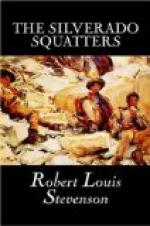To walk at all was a laborious business; the foot sank and slid, the boots were cut to pieces, among sharp, uneven, rolling stones. When we crossed the platform in any direction, it was usual to lay a course, following as much as possible the line of waggon rails. Thus, if water were to be drawn, the water-carrier left the house along some tilting planks that we had laid down, and not laid down very well. These carried him to that great highroad, the railway; and the railway served him as far as to the head of the shaft. But from thence to the spring and back again he made the best of his unaided way, staggering among the stones, and wading in low growth of the calcanthus, where the rattlesnakes lay hissing at his passage. Yet I liked to draw water. It was pleasant to dip the gray metal pail into the clean, colourless, cool water; pleasant to carry it back, with the water ripping at the edge, and a broken sunbeam quivering in the midst.
But the extreme roughness of the walking confined us in common practice to the platform, and indeed to those parts of it that were most easily accessible along the line of rails. The rails came straight forward from the shaft, here and there overgrown with little green bushes, but still entire, and still carrying a truck, which it was Sam’s delight to trundle to and fro by the hour with various ladings. About midway down the platform, the railroad trended to the right, leaving our house and coasting along the far side within a few yards of the madronas and the forge, and not far of the latter, ended in a sort of platform on the edge of the dump. There, in old days, the trucks were tipped, and their load sent thundering down the chute. There, besides, was the only spot where we could approach the margin of the dump. Anywhere else, you took your life in your right hand when you came within a yard and a half to peer over. For at any moment the dump might begin to slide and carry you down and bury you below its ruins. Indeed, the neighbourhood of an old mine is a place beset with dangers. For as still as Silverado was, at any moment the report of rotten wood might tell us that the platform had fallen into the shaft; the dump might begin to pour into the road below; or a wedge slip in the great upright seam, and hundreds of tons of mountain bury the scene of our encampment.
I have already compared the dump to a rampart, built certainly by some rude people, and for prehistoric wars. It was likewise a frontier. All below was green and woodland, the tall pines soaring one above another, each with a firm outline and full spread of bough. All above was arid, rocky, and bald. The great spout of broken mineral, that had dammed the canyon up, was a creature of man’s handiwork, its material dug out with a pick and powder, and spread by the service of the tracks. But nature herself, in that upper district, seemed to have had an eye to nothing besides mining; and even




